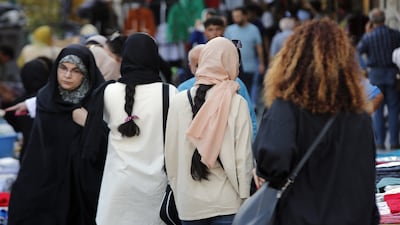Iran’s parliament has passed a bill toughening penalties for women flouting Tehran’s strict dress code, criticised by the UN and rights groups as gender apartheid.
The bill has been approved for a three-year trial period, the judiciary’s Mizan news reported.
Women failing to wear a headscarf or appropriate clothing, "in co-operation with foreign or hostile governments, media, groups or organisations", could face prison terms of five to 10 years.
It was passed in parliament on Wednesday, with 152 votes in favour, 34 against and seven abstentions.
The bill, containing more than 70 articles, now requires approval from Iran's Guardian Council, which is largely controlled by supreme leader Ayatollah Ali Khamenei.
The bill was proposed after months of nationwide protests following the death of Mahsa Amini, who died in police custody last year after allegedly breaching hijab rules.
Anyone who "mocks" the hijab "on social media or otherwise will be fined and can face a ban on leaving the country for up to two years, it added.
"A fine of one degree of aggravation and other punishments of the first degree will also be applied."
Business owners serving women without the hijab will also face a travel ban.
Many women have continued to defy Iran’s dress code in response to a crackdown from authorities, appearing in public without the mandatory hijab.
"It is a completely an act of gender apartheid by Iran's parliament, one woman in Tehran, who preferred to remain anonymous, told The National. "It's a full on war against women's rights."
Tehran has introduced several rules clamping down on women’s freedoms in recent months, including barring women without the hijab from universities and their workplaces.
Authorities have confiscated vehicles from women driving without a hijab after cameras were installed to track drivers within their own cars.
Under the new law, they will face a fine of five million rials, or around $118.
UN experts said the law “imposes severe punishments on women and girls for non-compliance which may lead to its violent enforcement".
Broadcasters will be expected to show programmes "to introduce and promote the symbols and patterns of the family-oriented Islamic lifestyle" and "the culture of chastity and hijab," according to the full version of the bill published by the IRGC-affiliated Fars news agency.
University admissions offices will also have to take chastity and the hijab into account when selecting students.
University students were particularly active in the recent protest movement, and have been arrested in their thousands. Experts have told The National universities are run by government-appointed administrators.
Women across Iran have reported increased morality police patrols in recent months.
Experts have told The National that women have been harassed in the street, barred from doctor's offices and prevented from visiting graves for appearing in public without the hijab.
Businesses have been closed for serving women without the hijab.
Last month, a water park was closed down by authorities for allegedly violating such rules, while women without the hijab have also been barred from Tehran's metro system.
"The pressures have escalated to the point of shutting down cafes, restaurants, and shopping centres. Even now, this situation has created tension within society, pitting people against each other," an employee from Gershad, which helps Iranian woman track the morality police, told The National.
"The fact that 10 individuals are making decisions for 85 million people will have a significant impact on women's resistance," they added.
Gershad has received more than 10,000 reports of unmarked morality police vans since they returned to the streets in July.
"This shows how people feel about the situation, and they do not wish to return to the previous status quo before Mahsa's death."














